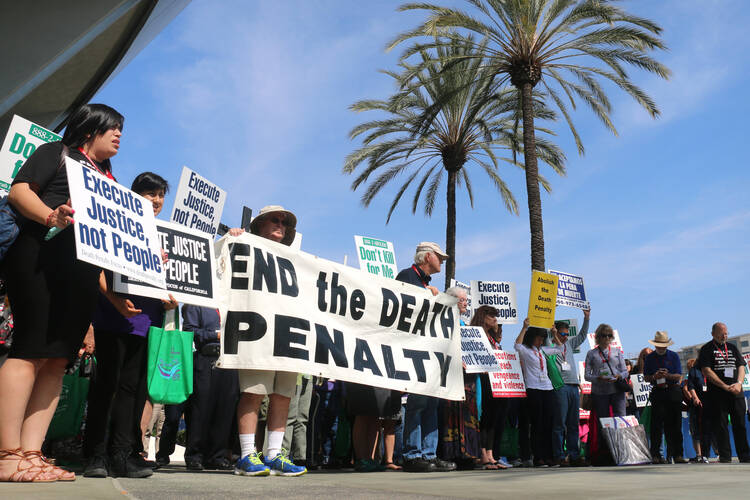“We want to let Catholics all throughout the state know that the death penalty is not necessary to protect public safety,” Tom Venzor, head of the Nebraska Catholic Conference, said at a press event on Sept. 29, “and for that reason, we urge to vote to retain the repeal of the death penalty.”
Last year, Nebraska’s state senators voted to repeal capital punishment. Gov. Pete Ricketts then vetoed the measure, but the unicameral legislature was able to override his veto. That led to a successful petition drive by pro-death penalty advocates to have voters settle the issue. Now Nebraskans will decide either to retain the repeal or to repeal the repeal.
Anti-death penalty advocates say that kind of language is confusing, so Catholic bishops, priests, sisters and lay people are using homilies, bulletin inserts, radio ads and social media to get the message out that the church is against capital punishment. Catholics make up just over a quarter of Nebraska’s total population, according to the Public Religion Research Institute, but the church’s anti-death penalty campaign is aimed at more than the state’s estimated 375,000 Catholics.
“The church’s message is a message for everybody across the state, for people of all faiths or no faith,” Venzor said. “We encourage not only Catholics but all people throughout the state to vote to retain the repeal of the death penalty.”
Nebraska will not be alone when it comes to death penalty questions this November.
Voters in California must decide two questions: whether to repeal the death penalty and whether or not to adopt a new process to speed up execution dates. Catholic leaders there have weighed in, urging the faithful to vote to end the death penalty.
And in Oklahoma, voters must decide whether or not to enshrine the death penalty in that state’s constitution. The practice is already legal there, but it is on hold following botched executions in 2015. Catholic bishops in New Mexico renounced a call by Gov. Susana Martínez, a Republican, for the legislature to reinstate the death penalty. The death penalty was abolished in Oklahoma more than seven years ago.
Karen Clifton, executive director of the Catholic Mobilizing Network to End the Use of the Death Penalty, said that upholding Nebraska’s ban and abolishing the death penalty in California could show that capital punishment is on its last legs in the United States.
“Churchwise, it would be a pro-life win, which we need,” she said. “It also sends a really strong message, especially when we have assisted suicide laws coming up for debate, that if the guilty have a right to live, then everyone does.”
Catholic leaders in Nebraska trying to convince their fellow citizens to back the church’s view on the death penalty face an uphill fight. A poll conducted earlier this summer for a pro-death penalty group found that a large majority of voters (58 percent) say they plan to repeal the repeal and bring capital punishment back to Nebraska.
The number of executions carried out in the United States has been on a downward trajectory since 1999, when 98 people were killed. So far this year, 15 people have been executed.
Acquiring the needed drugs to carry out executions has become more difficult for states, and public support is declining overall. Just 49 percent of Americans support the death penalty, according to the Pew Research Center, down from a high of 80 percent in 1994.







